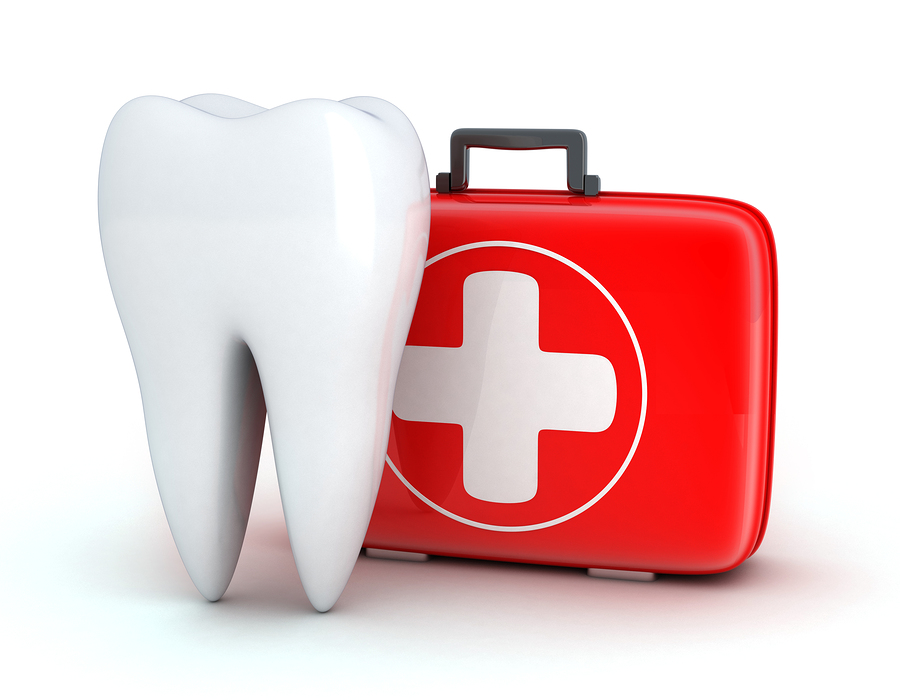 Doesn’t it always seem like emergencies happen during the most inconvenient times? We’re convinced too, bad things only happen when you’re on vacation, late at night, or in places where cell service is non-existent. Unfortunately, dental emergencies pretty much follow this same logic, and as such, there is no way around avoiding them. But that’s a good thing, sort of. We’ll explain later.
Doesn’t it always seem like emergencies happen during the most inconvenient times? We’re convinced too, bad things only happen when you’re on vacation, late at night, or in places where cell service is non-existent. Unfortunately, dental emergencies pretty much follow this same logic, and as such, there is no way around avoiding them. But that’s a good thing, sort of. We’ll explain later.
Like other types of emergencies, the best way to approach dental emergencies is to expect them, or in other words plan for them. In life, we’ve all heard the expression, if you fail to plan, then you plan to fail. That applies here too. Being prepared for dental emergencies won’t by any means, make it happen any less frequently. But what it can do is give you a better percentage of having a positive outcome.
Be Prepared – Where to Start
The first place to start is education. You need to learn how to identify and distinguish between real dental emergencies and the ones that, for a lack of a better word, aren’t real. And that’s what this blog will focus on. We will provide you with some common dental emergencies and the recommended action plan for each. But depending upon the severity of the accident, your condition may not be a true emergency. This means immediate assistance from your dentist is not critical to the saving of the tooth. There are still steps you’ll need to take including a trip to your dentist, but at the very least, some of your stress and anxiety should be reduced.
You Call That an Emergency?
Dental emergencies come in many different varieties. The most familiar ones usually involve some form of a traumatic blow to the mouth. This can happen when you fall, play sports, or been in an auto accident. The other types of dental emergencies can basically be summed up in three words: things just happen. These include old dental work failing, biting into something hard, or a sudden infection due to inadequate oral care over time.
We’ve put together a list of our most common dental emergencies and a game plan of what you should do. To further help you prepare, we’ve also given an Emergency Rating for each.
1. Knocked Out Tooth
If you experienced a sudden tooth being knocked out, it’s important to remain calm. Once you’ve gathered yourself, locate the missing tooth. Holding the crown of the tooth (the part you normally see), carefully rinse off any dirt or debris. After it’s cleaned, gently insert the tooth back into its correct position. If that’s not possible, the next best thing is to look for milk. Pour the milk into a glass or container and place the tooth inside (use water if milk is not available). The goal here is to keep the tooth alive as long as possible until you see your dentist. Milk contains proteins that will keep the exposed tissue in the tooth alive temporarily.
Emergency Rating: This is a true emergency. Your chance of saving the tooth is very good if you’re able to have your dentist return the tooth in its position within 1 hour.
2. Displaced Tooth
If your tooth is displaced or pushed out of position, the main concern here is pain management. Place an ice pack over the cheek or area where the tooth is to help reduce swelling. Take some over the counter pain medication as needed and contact your dentist immediately.
Emergency Rating: This is a true emergency. See your dentist right away to get the tooth stabilized. A displaced tooth can cause long term bone damage as well as damage to the surrounding teeth.
3. Fractured or Cracked Tooth
A cracked or fractured tooth usually occurs from biting or eating something hard. Often times, it’s not so much the external force that causes the fracture, but rather, it’s an internal collapse of the tooth’s structure. This is typically due to prolonged tooth decay or untreated infection. In the event of a tooth fracture, be careful not to swallow any tooth fragments. Rinse your mouth thoroughly and keep the tooth and area clean. Try to limit eating and drinking activities until you see your dentist. If the nerves are exposed, it could be a very painful experience.
Emergency Rating: This would be more like a moderate emergency. An immediate need to see the dentist is not necessary, although it’s not recommended to wait too long as other issues such as infection and pain could quickly develop causing tremendous pain.
4. Chipped Tooth
A chipped tooth is similar to a cracked tooth. The main difference is that it typically involves a blow to the mouth area and that the force of the blow is what caused the tooth to chip. This is common with sporting activities. The biggest challenge with a chipped tooth is getting over the initial mental shock. It may feel like there’s more damaged done to your mouth, but you’ll quickly realize it’s only the tooth.
Emergency Rating: This one ranks more on the, you’re lucky it could’ve been worse category. That means you don’t have to see your dentist right away. However, you will have to survive with having a chipped tooth for a few days. Just be careful about chewing since the chipped area may be sharp.
5. Tissue injuries
Tissue injuries are typically a result of direct trauma to the mouth. If your teeth aren’t chipped or knocked out, then it’s mainly a pain management issue. Even without any direct dental injuries, you could still sustain tears inside the mouth and lacerations to cheek, lips or tongue.
Emergency Rating: This one is a non emergency. If pain persists, an appointment with your dentist is recommended to confirm or dismiss any dental problems.
6. Toothache
Toothaches come in different levels of pain. They range from the annoying type, to the, I can’t sleep at night variety. A toothache could be a result of many things, such as severe tooth decay, a leaky filling, or result of a fractured tooth to name a few.
Emergency Rating: A toothache ranges from a non to a moderate emergency, depending on the condition. Again, pain management is the key factor. Taking pain medication such as ibuprofen or aspirin may help alleviate the pain temporarily. For more stubborn pain, see your dentist as soon as you can to get treatment.
7. Lost Filling or Crown
Old dental work is susceptible to failure. Over time with constant wear and tear, fillings can shrink and cement material for crowns may loosen. Because of this, crowns and fillings could unexpectedly fall out while you eat, especially if it’s a sticky or hard food, like caramel or apples. The real concern here is to make sure the exposed area is kept clean. Rinse your mouth with water and limit the eating and drinking.
Emergency Rating: This is a moderate level emergency. A visit to the dentist will be needed to have your crown re-cemented or filling redone. As a precaution, your dentist will also screen for infection or other dental problems that could develop.
Thank you for reading and remember to Like Us on Facebook and never miss another blog!
Written by Dr. Kim H. Nguyen

Owner of Mint Dental OC and is a leading dentist in Southern California.





